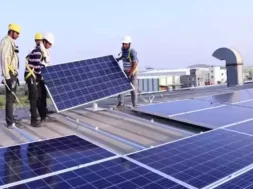
Electric Vehicle Evangelism
Need some reasons why you should try an electric vehicle?
Step on brake. Push starter button. Press pedal. Quietly move to your destination with zero emissions and little expense. Help reduce climate change impacts, improve public health, and spur new jobs. It’s an electric vehicle. What’s not to like?
Talk about improving the local economy…Volkswagen (VW) is promising 1,000 jobs here in Chattanooga to build their electric vehicles! Today one can purchase an electric vehicle (EV) made by Tesla, Chevy, Ford, Kia, and others. In fact, today more than three million electric vehicles are on roads around the world. In 2018, reports say U.S. sales numbered 361,307, up 81 percent over 2017. China leads in sales, but the rest of the world is starting to catch up.
VW is jumping on this fast-moving train—er, highway. They expect to sell 150,000 EVs worldwide by 2020. The first VW Chattanooga EV, a Crossover, will roll off the production line in 2022. Perhaps VW will be atoning for their sin of rigged diesel emission testing evasion by producing cars with no emissions.
In 2011 Bill and Sue Reynolds purchased their first Leaf electric vehicle. Since then they have replaced it twice and now drive a 2018 model.
“We love the quietness; we love the instant get up and go—it really zips,” Bill says. “And there’s no oil change.”
When the Reynolds’ Leaf was recently taken in for a 3,500-mile maintenance check, they just rotated the tires. After all, there are few moving parts. There’s no transmission, engine block, pistons, valves, valve guides, engine oil pump, exhaust pipes, exhaust gas re-circulation pump, catalytic converter, muffler, starter, or alternator. There’s no reason for gas emissions testing.
We certainly appreciate VW’s decision to provide jobs for our area, but most importantly, from a sustainable point of view, electric vehicles make a wonderful contribution to meeting climate change targets. They do away with giant amounts of greenhouse gas emissions that come from the transportation sector of the economy.
There is argument about how much of an improvement there might be, but that’s because presently fossil fuels pollute while making electricity for each vehicle. Even then, reduced street-level pollution from gas-powered cars means respiratory health improves.
A report released by Environment Ohio says adding more electric vehicles to the road would be equivalent to taking 78,000 carbon-emitting trucks and cars off the road by 2025. If we can further decarbonize electricity generation with, say, solar and wind power, we would be much further along in slowing or eliminating climate change impacts.
As industry transitions to more electric vehicles it will likely bring some governmental policies supporting advanced information technology and battery research. Would you believe there could be a future ban on the sale of gas vehicles? In fact, the Hainan Province in China has proposed a ban on such sales and has set a goal of 100 percent new energy vehicles across the island by 2030.
By now, dear reader, you may have thought of those electric vehicle drawbacks that keep you from a purchase despite all the benefits. What about small range between charges, battery life, and a too-high purchase cost?
You will be pleased to know that the range will increase soon, likely to 400 miles. Presently the Chevy Bolt comes in at 238 miles between charges (albeit less for other brands). Daily charging easily meets needs for most and with more charging stations available, a 30-minute stop while traveling further will get you there.
Batteries last 8–10 years. Presently most companies offer eight-year warranties. Replacements are expensive, but still the car is cheaper to run overall.
VW has not yet determined the Chattanooga EV cost, but it may be around $35,000. However, Forbes says EVs are cheaper over time due to maintenance and electricity costs being cheaper than gas for operation. A quick check of car ads also shows that there are used EVs on the market in the $10,000–$15,000 range.
By the way, electric plug-in car purchasers may be eligible for a federal or state tax credit.
There is one other way you can save operational money for your EV and help the environment, too: install a solar unit in your house to use for carbon-free home charging or buy into EPB’s Solar Share. Or imagine yourself driving a car clad with solar panels! Prototypes do exist.
Aside from riding a bike, an EV is a great deal cost-wise and environmentally…even if you have to replace windshield wipers!
Sandra Kurtz is an environmental community activist, chair of the South Chickamauga Creek Greenway Alliance, and is presently working through the Urban Century Institute. You can visit her website to learn more at enviroedu.netw















